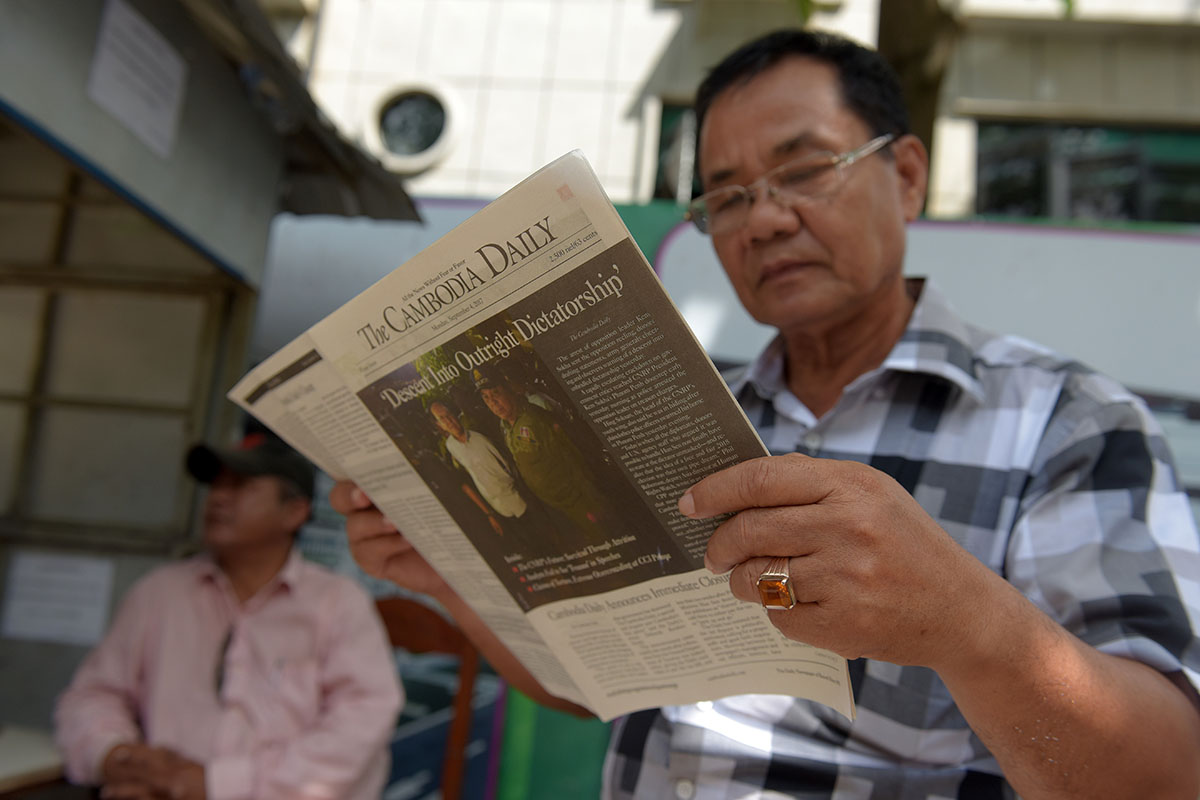One of Cambodia's few remaining independent newspapers announced on Sunday it would close hours after the country's opposition leader was arrested for treason, the latest in a string of blows to critics of strongman premier Hun Sen.
The Cambodia Daily, which is often critical of the government, said Monday's edition would be its last after it was slapped with a multi-million dollar tax bill that its publishers said was politically motivated.
The announcement came after Kem Sokha, head of the opposition Cambodian National Rescue Party (CNRP), was arrested shortly after midnight on treason charges with Prime Minister Hun Sen accusing him of acting in cahoots with Washington, an escalation of his often angry rhetoric against the US.
The Southeast Asian country has been run for more than three decades by 65-year-old Hun Sen, a wily political operator who has long used the courts and strongarm tactics to silence critics.
He faces a key test at national polls next year with the main opposition party gaining in popularity amid mounting anger over corruption and inequality.
A series of prosecutions have been brought against political opponents and rights workers in the last year, as well as tax and other investigations of organisations deemed critical of his administration.
In a statement announcing its closure, the Cambodia Daily said it had been "destroyed" by the government.
"It's a dark day for press freedom in Cambodia," editor Jodie DeJonge, told AFP.
The paper was set up 24 years ago by veteran American journalist Bernard Krisher who recently sold it to his daughter Deborah Krisher-Steele. It publishes in English but carries some articles in Khmer and is often critical of the government.
Last month the tax department said the paper owned $6.3 million in back taxes, with Hun Sen branding the owners "thieves".
The paper said the figure was "arbitrary" and not based on an audit of its books, with management accusing the government of targeting it for its critical reporting.
Much of Cambodia's media is either owned by people close to Hun Sen or avoids criticising the government.
Former editor Kevin Doyle tweeted: "In closing the Daily, PM Hun Sen is not just silencing a critic, he's ending an earlier, more hopeful vision of Cambodia's future."
US conspiracy
Kem Sokha's surprise overnight detention raises the stakes as Hun Sen's political opponents, NGOs and the critical press are smothered by court cases and threats ahead of the election next year.
In a statement, Hun Sen's government alleged "a secret plan of conspiracy between Kem Sokha, his group, and foreigners that harms Cambodia".
The government has yet to detail what Kem Sokha has allegedly done that constitutes treason.
But in a speech on Sunday, Hun Sen accused him of working with Washington.
"Behind his (Kem Sokha's) hand it is still the same, it is America," he said.
Kem Sokha is the leader of the CNRP which has been battered by court cases, bans and threats against its key figures, including his predecessor Sam Rainsy who fled to France to avoid charges.
The CNRP called the arrest "politically motivated".
The arrest came just hours after pro-government website Fresh News ran a report accusing Kem Sokha of discussing the overthrow of Hun Sen with support from the United States.
Fresh News frequently runs leaks from inside the government that often precede an investigation or arrest.
However Saturday's report was based on a 2013 speech Kem Sokha gave to supporters in Australia with cameras present.
During the speech he boasted that the US was "advising me about strategies to change the dictatorship in Cambodia".
Washington has a complex and fraught history with Cambodia, secretly bombing it during the Vietnam War era and then becoming one of the country's biggest aid donors as it tried to rebuild from the murderous Khmer Rouge years.
Hun Sen, a former Khmer Rouge commander who defected, portrays himself as the only person who can bring stability and prosperity to a country once ravaged by civil war and genocide.
In the last decade, Cambodia has become one of Asia's fastest growing economies.
But there is rising anger, especially among the youth, over how that wealth is spread and the cronyism that remains endemic under his rule.
In 2013 the opposition parties made surprise gains, giving Hun Sen his first ever electoral scare. – AFP
